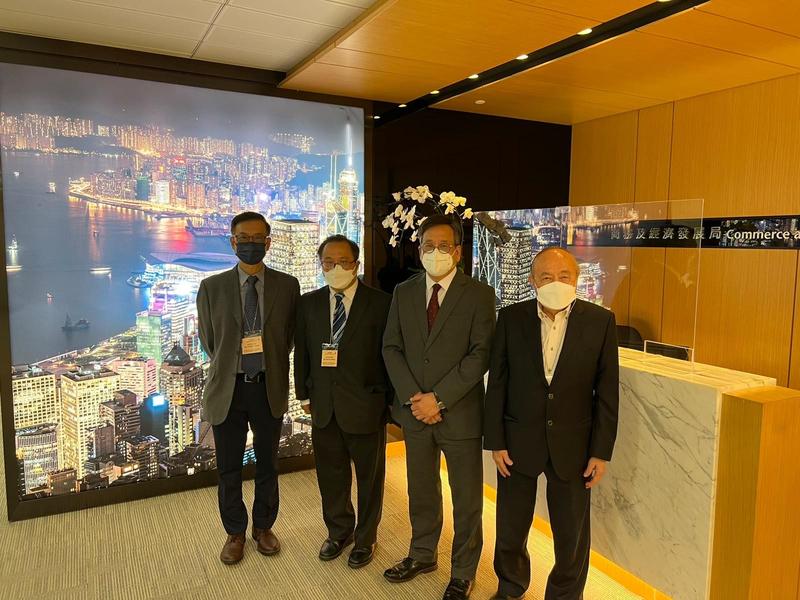 Tony Ho (second left), director of the Indonesian Chamber of Commerce in Hong Kong and vice-chairman of the Hong Kong International Chamber of Commerce, poses for a group photo with Hong Kong Secretary for Commerce and Economic Development Algernon Yau Ying-wah (third left) during a visit. (PHOTO PROVIDED TO CHINA DAILY)
Tony Ho (second left), director of the Indonesian Chamber of Commerce in Hong Kong and vice-chairman of the Hong Kong International Chamber of Commerce, poses for a group photo with Hong Kong Secretary for Commerce and Economic Development Algernon Yau Ying-wah (third left) during a visit. (PHOTO PROVIDED TO CHINA DAILY)
HONG KONG – Opportunities in logistics, financial and legal services presented by the Belt and Road Initiative will spring up for those in the Hong Kong business community who seek trade ties to Indonesia, but more work is needed to enhance people’s understanding of Hong Kong’s role in the national strategy.
Tony Ho, director of Indonesian Chamber of Commerce in Hong Kong, made this during an interview with China Daily.
Given Hong Kong is positioned as a gateway between the Chinese mainland and Indonesian markets, Ho said its business sector can benefit from its sophisticated legal, tax systems, and world-class infrastructure, from which people should seize the chance to provide professional services to BRI projects in Indonesia and other Association of Southeast Asian Nations.
“Many Hong Kong residents have not figured out what role Hong Kong can play in the BRI in the future,” Ho said, noting that Vice-Premier Han Zheng had pointed out Hong Kong has unique strengths that can play an essential role in developing the BRI, thus creating its future economic cornerstone.
Han delivered a speech during the Belt and Road Summit on Aug 31, underscoring Hong Kong’s competitive advantages on the global stage as part of the central government’s support for maintaining its common law system, while developing high-value-added shipping services, improving financial services and cooperation, along with providing legal shipping and financial consultancy for BRI projects.
Hailing the speech for giving Hong Kong a clear and precise direction and goal, Ho, who is also vice-chairman of the Hong Kong International Chamber of Commerce, said the business community can play an active role as a stakeholder in the BRI.
“The reason is that Hong Kong uses common law, applied by the majority of international trade for contracts, while the mainland follows civil law, so foreign firms doing business with mainland companies can use Hong Kong to set legal standards.
“Besides, as the city has a simple tax system and low tax rates, bank interest and financing costs are relatively cheaper. Overseas enterprises also find it easy to raise funds here,” he added.
As ASEAN demand great funds for their BRI projects, enterprises can finance in Hong Kong due to lower costs and then invest in these governments’ projects to gain profits, Ho said. “It is a mutual-benefit mechanism as more jobs could be created and the local economy could be developed with sufficient capital.”
 Tony Ho (second right, third row), director of the Indonesian Chamber of Commerce in Hong Kong and vice-chairman of the Hong Kong International Chamber of Commerce, connects online with an official of the Huaihua municipal government and trade representatives from the Association of Southeast Asian Nations. (PHOTO PROVIDED TO CHINA DAILY)
Tony Ho (second right, third row), director of the Indonesian Chamber of Commerce in Hong Kong and vice-chairman of the Hong Kong International Chamber of Commerce, connects online with an official of the Huaihua municipal government and trade representatives from the Association of Southeast Asian Nations. (PHOTO PROVIDED TO CHINA DAILY)
Ho noted the special administrative region government’s hundred-billion-dollar investment in infrastructure construction, including the establishment of the third runway at its international airport, will make Hong Kong a major logistics center for the southbound passage of the BRI.
“The mainland’s export volume will grow bigger, which helps to boost Hong Kong’s shipping sector,” he said.
Ho said many Hong Kong people aim to do business with ASEAN countries but don’t know how to start, therefore, he called for the establishment of an ASEAN-Hong Kong business council, an advisory body supporting the city’s business community in accessing related information and resources.
ASEAN was Hong Kong’s second-largest trading partner last year with a trading value amounting to $132.9 billion, while foreign direct investment from Hong Kong accounted for 3.1 percent of the trade bloc’s total. In 2017, Hong Kong and ASEAN signed a Free Trade Agreement and an Investment Agreement, promoting trade and investment flows between the two regions.
Ho urged the SAR government to put more capital investment in ASEAN to create high value-added opportunities, as well as implement detailed and follow-up plans in the BRI.
“Our chamber will continue to cooperate with the government and relevant business institutions to develop the BRI, Regional Comprehensive Economic Partnership, and the Guangdong-Hong Kong- Macao Greater Bay Area. Efforts will be made in a resource integration method in these policies,” he said.
Contact the writer at tianyuanzhang@chinadailyhk.com


